Deck 22: Circulation and Respiration
Question
Question
Question
Question
Question
Question
Question
Question
Question
Question
Question
Question
Question
Question
Question
Question
Question
Question
Question
Question
Question
Question
Question
Question
Question
Question
Question
Question
Question
Question
Question
Question
Question
Question
Question
Question
Question
Question
Question
Question
Question
Question
Question
Question
Question
Question
Question
Question
Question
Question
Question
Question
Question
Question
Question
Question
Question
Question
Question
Question
Question
Question
Match between columns
Question
Match between columns
Question
Question
Match between columns
Question
Question
Question
Question
Question
Question
Question
Match between columns
Question
Question

Unlock Deck
Sign up to unlock the cards in this deck!
Unlock Deck
Unlock Deck
1/74
Play
Full screen (f)
Deck 22: Circulation and Respiration
1
The pulmonary circuit moves blood from _____.
A) the ventricle to the lungs and then back to the heart and then to the body tissues
B) the atrium to the lungs and then directly to the body tissues
C) the ventricle to the body tissue and then to the lungs
D) the atrium to the body tissue and then to the heart
E) the atrium to the lungs and then back to the heart and then to the body tissues
A) the ventricle to the lungs and then back to the heart and then to the body tissues
B) the atrium to the lungs and then directly to the body tissues
C) the ventricle to the body tissue and then to the lungs
D) the atrium to the body tissue and then to the heart
E) the atrium to the lungs and then back to the heart and then to the body tissues
A
2
About ____ seconds into a cardiac arrest, the brain becomes starved for oxygen and the person loses consciousness.
A) 5
B) 10
C) 30
D) 60
E) 120
A) 5
B) 10
C) 30
D) 60
E) 120
B
3
A key advantage of having a four-chambered heart is ____.
A) only oxygen-rich blood flows to tissues
B) blood pressure in the separate circuits is not independently controlled
C) two separate circuits are possible
D) lungs are only possible with a four-chambered heart
E) blood oxygenates more quickly
A) only oxygen-rich blood flows to tissues
B) blood pressure in the separate circuits is not independently controlled
C) two separate circuits are possible
D) lungs are only possible with a four-chambered heart
E) blood oxygenates more quickly
A
4
This animal has two atria and one ventricle and two vascular circuits. This animal is a(n) ____.
A) salmon
B) woodpecker
C) alligator
D) rat
E) frog
A) salmon
B) woodpecker
C) alligator
D) rat
E) frog

Unlock Deck
Unlock for access to all 74 flashcards in this deck.
Unlock Deck
k this deck
5
Thanks to the efforts of Matt Nader, Texas passed a law requiring that all high schools have ____.
A) more CPR classes
B) physicians at all football games
C) rigorous physical examinations for all high school athletes
D) automated external defibrillators available for emergencies
E) coaches who do not overexert the school's athletes
A) more CPR classes
B) physicians at all football games
C) rigorous physical examinations for all high school athletes
D) automated external defibrillators available for emergencies
E) coaches who do not overexert the school's athletes

Unlock Deck
Unlock for access to all 74 flashcards in this deck.
Unlock Deck
k this deck
6
Defibrillators work by ____.
A) pumping adrenalin into heart tissue
B) delivering an electric shock to the heart's pacemaker
C) automating CPR
D) massaging the heart using remote sensors
E) delivering mechanical pressure to the heart
A) pumping adrenalin into heart tissue
B) delivering an electric shock to the heart's pacemaker
C) automating CPR
D) massaging the heart using remote sensors
E) delivering mechanical pressure to the heart

Unlock Deck
Unlock for access to all 74 flashcards in this deck.
Unlock Deck
k this deck
7
The circulatory system below would be representative of a circulatory system found in a ____. 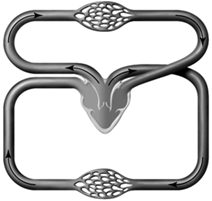
A) frog
B) pig
C) bird
D) grasshopper
E) pig and a bird

A) frog
B) pig
C) bird
D) grasshopper
E) pig and a bird

Unlock Deck
Unlock for access to all 74 flashcards in this deck.
Unlock Deck
k this deck
8
Some invertebrates move gases across their cell's membrane by ___ through interstitial fluid.
A) active transport
B) facilitated diffusion
C) bulk transport
D) diffusion
E) osmosis
A) active transport
B) facilitated diffusion
C) bulk transport
D) diffusion
E) osmosis

Unlock Deck
Unlock for access to all 74 flashcards in this deck.
Unlock Deck
k this deck
9
Arteries carry ____.
A) blood toward the heart
B) blood away from the heart
C) only oxygen-rich blood
D) only oxygen-poor blood
E) a combination of more than one of these
A) blood toward the heart
B) blood away from the heart
C) only oxygen-rich blood
D) only oxygen-poor blood
E) a combination of more than one of these

Unlock Deck
Unlock for access to all 74 flashcards in this deck.
Unlock Deck
k this deck
10
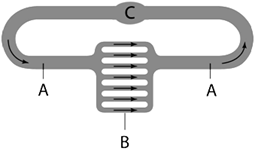 The above diagram is an example of ____.
The above diagram is an example of ____.A) a closed circulatory system with one heart
B) an open circulatory system with one heart
C) a closed circulatory system with a three-chambered heart
D) an open circulatory system with a two-chambered heart
E) a closed circulatory system with a four-chambered heart

Unlock Deck
Unlock for access to all 74 flashcards in this deck.
Unlock Deck
k this deck
11
An animal has a two-chambered heart and blood flows in a single circuit. This animal is a ____.
A) crocodile
B) frog
C) red-winged blackbird
D) salmon
E) bear
A) crocodile
B) frog
C) red-winged blackbird
D) salmon
E) bear

Unlock Deck
Unlock for access to all 74 flashcards in this deck.
Unlock Deck
k this deck
12
This animal has two atria and two ventricles and two vascular circuits. This animal is a(n) ____.
A) mountain bluebird
B) fire-bellied toad
C) trout
D) lobster
E) cod
A) mountain bluebird
B) fire-bellied toad
C) trout
D) lobster
E) cod

Unlock Deck
Unlock for access to all 74 flashcards in this deck.
Unlock Deck
k this deck
13
One advantage of the three-chambered heart over the two-chambered heart is that ____.
A) oxygen-rich and oxygen-poor blood do not mix
B) blood pressure is independently controlled in each vascular circuit
C) blood flow is faster when there are two circuits instead of one
D) capillary beds are possible with a three-chambered heart but not a two-chambered heart
E) oxygen-rich and oxygen-poor blood mix
A) oxygen-rich and oxygen-poor blood do not mix
B) blood pressure is independently controlled in each vascular circuit
C) blood flow is faster when there are two circuits instead of one
D) capillary beds are possible with a three-chambered heart but not a two-chambered heart
E) oxygen-rich and oxygen-poor blood mix

Unlock Deck
Unlock for access to all 74 flashcards in this deck.
Unlock Deck
k this deck
14
Circulatory systems ____.
A) are found in all animals
B) result in slow distribution of nutrients and gases
C) include one or more hearts
D) are always closed systems
E) are found in cnidarians and flatworms
A) are found in all animals
B) result in slow distribution of nutrients and gases
C) include one or more hearts
D) are always closed systems
E) are found in cnidarians and flatworms

Unlock Deck
Unlock for access to all 74 flashcards in this deck.
Unlock Deck
k this deck
15
When the heart's pacemaker malfunctions, ___ can result.
A) atherosclerosis
B) sudden cardiac arrest
C) congenital heart defects
D) coronary heart diseases
E) hypertrophic cardiac defects
A) atherosclerosis
B) sudden cardiac arrest
C) congenital heart defects
D) coronary heart diseases
E) hypertrophic cardiac defects

Unlock Deck
Unlock for access to all 74 flashcards in this deck.
Unlock Deck
k this deck
16
Amphibian and most reptiles have ____.
A) a two-chambered heart with two blood flow circuits
B) a three-chambered heart with two blood flow circuits
C) a four-chambered heart with two blood flow circuits
D) a three-chambered heart with one blood flow circuit
E) a two-chambered heart with one blood flow circuit
A) a two-chambered heart with two blood flow circuits
B) a three-chambered heart with two blood flow circuits
C) a four-chambered heart with two blood flow circuits
D) a three-chambered heart with one blood flow circuit
E) a two-chambered heart with one blood flow circuit

Unlock Deck
Unlock for access to all 74 flashcards in this deck.
Unlock Deck
k this deck
17
An animal with an open circulatory system ____.
A) lacks a continuous network of blood vessels that contain the blood at all times
B) can have only one heart
C) has two separate vascular circuits
D) is able to distribute substances faster than a closed system
E) can grow larger than one with a closed circulatory system
A) lacks a continuous network of blood vessels that contain the blood at all times
B) can have only one heart
C) has two separate vascular circuits
D) is able to distribute substances faster than a closed system
E) can grow larger than one with a closed circulatory system

Unlock Deck
Unlock for access to all 74 flashcards in this deck.
Unlock Deck
k this deck
18
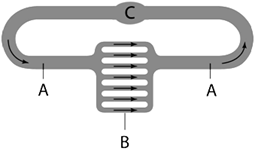 In the above diagram, C represents ____.
In the above diagram, C represents ____.A) large diameter blood vessels
B) capillary beds
C) the zone of diffusion of gases and nutrients
D) the heart
E) capillary beds and the zone of diffusion of gases and nutrients

Unlock Deck
Unlock for access to all 74 flashcards in this deck.
Unlock Deck
k this deck
19
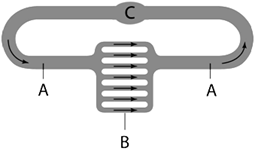 In the above diagram, B represents ____.
In the above diagram, B represents ____.A) large diameter blood vessels
B) capillary beds
C) the zone of diffusion of gases and nutrients
D) the heart
E) capillary beds and the zone of diffusion of gases and nutrients

Unlock Deck
Unlock for access to all 74 flashcards in this deck.
Unlock Deck
k this deck
20
The purpose of performing CPR on a person who has experienced sudden cardiac arrest is to ____.
A) restart their heart
B) ensure an oxygen supply to their brain
C) keep their lungs inflated
D) restart their heart and ensure an oxygen supply to their brain
E) restart their heart and keep their lungs inflated
A) restart their heart
B) ensure an oxygen supply to their brain
C) keep their lungs inflated
D) restart their heart and ensure an oxygen supply to their brain
E) restart their heart and keep their lungs inflated

Unlock Deck
Unlock for access to all 74 flashcards in this deck.
Unlock Deck
k this deck
21
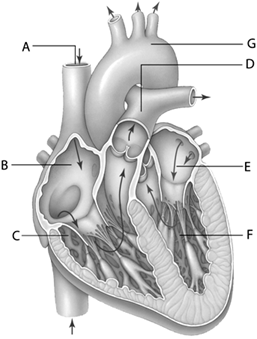 The structure labeled "D" is the ____.
The structure labeled "D" is the ____.A) aorta
B) right atrium
C) left atrium
D) trunk of the pulmonary arteries
E) superior vena cava

Unlock Deck
Unlock for access to all 74 flashcards in this deck.
Unlock Deck
k this deck
22
The driving force for blood circulation is ____.
A) contraction of the atria
B) contraction of the ventricles
C) closing of the AV valves
D) opening of the AV valves
E) closing of the aortic valve
A) contraction of the atria
B) contraction of the ventricles
C) closing of the AV valves
D) opening of the AV valves
E) closing of the aortic valve

Unlock Deck
Unlock for access to all 74 flashcards in this deck.
Unlock Deck
k this deck
23
Blood pumped from the left ventricle goes into the ____.
A) vena cava
B) aorta
C) pulmonary artery
D) right ventricle
E) left atrium
A) vena cava
B) aorta
C) pulmonary artery
D) right ventricle
E) left atrium

Unlock Deck
Unlock for access to all 74 flashcards in this deck.
Unlock Deck
k this deck
24
When the atria of the heart are full of blood, the ____ valves are closed.
A) atrioventricular
B) aortic
C) pulmonary
D) pulmonary and aortic
E) atrioventricular and aortic
A) atrioventricular
B) aortic
C) pulmonary
D) pulmonary and aortic
E) atrioventricular and aortic

Unlock Deck
Unlock for access to all 74 flashcards in this deck.
Unlock Deck
k this deck
25
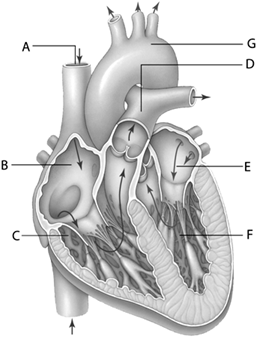 The structure labeled "C" is the ____.
The structure labeled "C" is the ____.A) trunk of the pulmonary arteries
B) left atrium
C) left ventricle
D) right atrium
E) right ventricle

Unlock Deck
Unlock for access to all 74 flashcards in this deck.
Unlock Deck
k this deck
26
Pulmonary veins carry ____.
A) oxygen-rich blood back to the heart
B) oxygen-poor blood back to the heart
C) oxygen-rich blood away from the heart
D) oxygen-poor blood away from the heart
E) oxygen-rich blood to and from the heart
A) oxygen-rich blood back to the heart
B) oxygen-poor blood back to the heart
C) oxygen-rich blood away from the heart
D) oxygen-poor blood away from the heart
E) oxygen-rich blood to and from the heart

Unlock Deck
Unlock for access to all 74 flashcards in this deck.
Unlock Deck
k this deck
27
If a small blood vessel is torn, ____ will temporarily fill the breach.
A) plasma proteins
B) leukocytes
C) platelets
D) erythrocytes
E) fibrin
A) plasma proteins
B) leukocytes
C) platelets
D) erythrocytes
E) fibrin

Unlock Deck
Unlock for access to all 74 flashcards in this deck.
Unlock Deck
k this deck
28
Red blood cells in mammals ____.
A) have a large nucleus when they enter circulation
B) do not have a nucleus when they enter circulation
C) are the only cells to lack hemoglobin
D) develop in the yellow marrow
E) function as part of the immune system
A) have a large nucleus when they enter circulation
B) do not have a nucleus when they enter circulation
C) are the only cells to lack hemoglobin
D) develop in the yellow marrow
E) function as part of the immune system

Unlock Deck
Unlock for access to all 74 flashcards in this deck.
Unlock Deck
k this deck
29
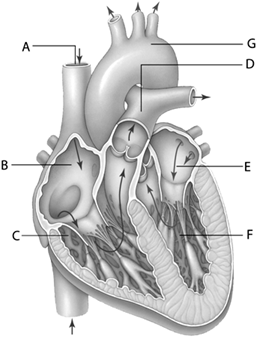 The structure labeled "B" is the ____.
The structure labeled "B" is the ____.A) right ventricle
B) right atrium
C) left atrium
D) left ventricle
E) superior vena cava

Unlock Deck
Unlock for access to all 74 flashcards in this deck.
Unlock Deck
k this deck
30
Which structure associated with the human heart contains oxygen-rich blood?
A) right atrium
B) right ventricle
C) pulmonary artery
D) aorta
E) superior vena cava
A) right atrium
B) right ventricle
C) pulmonary artery
D) aorta
E) superior vena cava

Unlock Deck
Unlock for access to all 74 flashcards in this deck.
Unlock Deck
k this deck
31
When ventricles are full of blood, the ____ valves are closed.
A) atrioventricular
B) aortic
C) pulmonary
D) aortic and pulmonary
E) atrioventricular and aortic
A) atrioventricular
B) aortic
C) pulmonary
D) aortic and pulmonary
E) atrioventricular and aortic

Unlock Deck
Unlock for access to all 74 flashcards in this deck.
Unlock Deck
k this deck
32
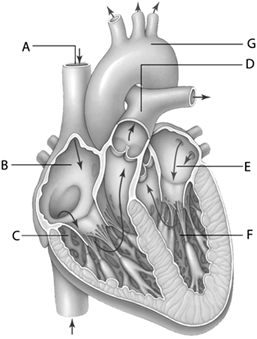 The structure labeled "F" is the ____.
The structure labeled "F" is the ____.A) right ventricle
B) left atrium
C) left ventricle
D) right atrium
E) superior vena cava

Unlock Deck
Unlock for access to all 74 flashcards in this deck.
Unlock Deck
k this deck
33
Beginning with the heart, which is the correct order of blood flow, as represented by steps 1-5 in the flow chart below? 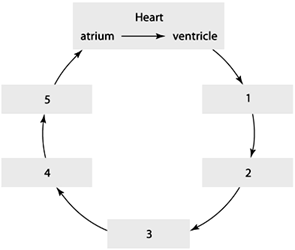
A) capillaries; venules; veins; arteries; arterioles
B) arterioles; arteries; venules; veins; capillaries
C) arteries; arterioles; capillaries; venules; veins
D) veins; venules; capillaries; arterioles; arteries
E) arteries; veins; arterioles; capillaries; venules

A) capillaries; venules; veins; arteries; arterioles
B) arterioles; arteries; venules; veins; capillaries
C) arteries; arterioles; capillaries; venules; veins
D) veins; venules; capillaries; arterioles; arteries
E) arteries; veins; arterioles; capillaries; venules

Unlock Deck
Unlock for access to all 74 flashcards in this deck.
Unlock Deck
k this deck
34
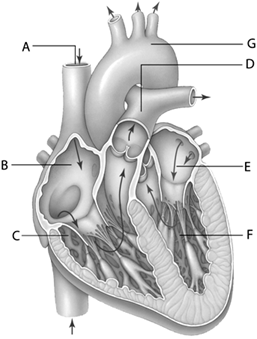 The structure labeled "G" is the ____.
The structure labeled "G" is the ____.A) aorta
B) pulmonary vein
C) pulmonary artery
D) inferior vena cava
E) superior vena cava

Unlock Deck
Unlock for access to all 74 flashcards in this deck.
Unlock Deck
k this deck
35
The ____ contain(s) oxygen-poor blood.
A) left ventricle
B) left atrium
C) aorta
D) pulmonary arteries
E) pulmonary veins
A) left ventricle
B) left atrium
C) aorta
D) pulmonary arteries
E) pulmonary veins

Unlock Deck
Unlock for access to all 74 flashcards in this deck.
Unlock Deck
k this deck
36
The heart is surrounded by the _____, a double layered sac that protects it and anchors it in place.
A) peritoneum
B) perineum
C) pericardium
D) peristalsis
E) periwinkle
A) peritoneum
B) perineum
C) pericardium
D) peristalsis
E) periwinkle

Unlock Deck
Unlock for access to all 74 flashcards in this deck.
Unlock Deck
k this deck
37
When blood flows through pulmonary capillaries, it picks up ___ and releases ___.
A) carbon dioxide; carbon dioxide
B) carbon dioxide; oxygen
C) oxygen; oxygen
D) oxygen; carbon dioxide
E) oxygen or carbon dioxide; either
A) carbon dioxide; carbon dioxide
B) carbon dioxide; oxygen
C) oxygen; oxygen
D) oxygen; carbon dioxide
E) oxygen or carbon dioxide; either

Unlock Deck
Unlock for access to all 74 flashcards in this deck.
Unlock Deck
k this deck
38
Which action of the heart makes the first of the "lup-dup" sounds?
A) closing of the atrioventricular valves
B) closing of the pulmonary valve
C) closing of the aortic valve
D) the contraction of the left ventricle
E) the contraction of the right ventricle
A) closing of the atrioventricular valves
B) closing of the pulmonary valve
C) closing of the aortic valve
D) the contraction of the left ventricle
E) the contraction of the right ventricle

Unlock Deck
Unlock for access to all 74 flashcards in this deck.
Unlock Deck
k this deck
39
In this diagram of the heart, A is the ____ and B is the ____. 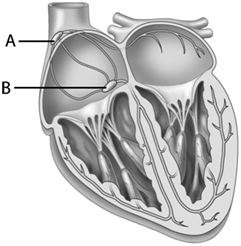
A) AV node; cardiac pacemaker
B) SA node; septum
C) AV node; SA node
D) SA node; AV node
E) septum; cardiac pacemaker

A) AV node; cardiac pacemaker
B) SA node; septum
C) AV node; SA node
D) SA node; AV node
E) septum; cardiac pacemaker

Unlock Deck
Unlock for access to all 74 flashcards in this deck.
Unlock Deck
k this deck
40
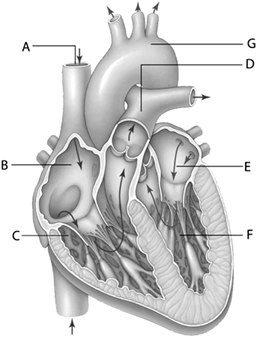 The structure labeled "A" is the ____.
The structure labeled "A" is the ____.A) aorta
B) inferior vena cava
C) pulmonary artery
D) pulmonary vein
E) superior vena cava

Unlock Deck
Unlock for access to all 74 flashcards in this deck.
Unlock Deck
k this deck
41
Insects use _____ as a respiratory system.
A) integument exchange
B) l ungs
C) tracheal exchange
D) g ills
E) capillary tubes
A) integument exchange
B) l ungs
C) tracheal exchange
D) g ills
E) capillary tubes

Unlock Deck
Unlock for access to all 74 flashcards in this deck.
Unlock Deck
k this deck
42
The respiratory surface of an earthworm is located in the _____.
A) lungs
B) gills
C) skin
D) gastrovascular cavities
E) trachea
A) lungs
B) gills
C) skin
D) gastrovascular cavities
E) trachea

Unlock Deck
Unlock for access to all 74 flashcards in this deck.
Unlock Deck
k this deck
43
A genetic disorder characterized by impaired blood clotting is ____.
A) leukemia
B) sickle cell anemia
C) hemophilia
D) atherosclerosis
E) hypertension
A) leukemia
B) sickle cell anemia
C) hemophilia
D) atherosclerosis
E) hypertension

Unlock Deck
Unlock for access to all 74 flashcards in this deck.
Unlock Deck
k this deck
44
Capillary walls consist of ____.
A) stratified squamous epithelium
B) simple squamous epithelium
C) simple cuboidal epithelium
D) stratified cuboidal epithelium
E) simple columnar epithelium
A) stratified squamous epithelium
B) simple squamous epithelium
C) simple cuboidal epithelium
D) stratified cuboidal epithelium
E) simple columnar epithelium

Unlock Deck
Unlock for access to all 74 flashcards in this deck.
Unlock Deck
k this deck
45
Blood pressure is lowest when ventricles are _____; this is known as _____.
A) fully relaxed; systolic pressure
B) contracting; diastolic pressure
C) contracting; systolic pressure
D) fully relaxed; diastolic pressure
E) in transition; systolic pressure
A) fully relaxed; systolic pressure
B) contracting; diastolic pressure
C) contracting; systolic pressure
D) fully relaxed; diastolic pressure
E) in transition; systolic pressure

Unlock Deck
Unlock for access to all 74 flashcards in this deck.
Unlock Deck
k this deck
46
Blood flow distribution can be adjusted by changing the diameter of the ____.
A) arteries
B) capillaries
C) arterioles
D) veins
E) venules
A) arteries
B) capillaries
C) arterioles
D) veins
E) venules

Unlock Deck
Unlock for access to all 74 flashcards in this deck.
Unlock Deck
k this deck
47
A stroke may occur when a vessel in the ____.
A) brain ruptures
B) heart ruptures
C) brain is blocked by a clot
D) heart is blocked by a clot
E) heart ruptures and a vessel in the brain is blocked by a clot
A) brain ruptures
B) heart ruptures
C) brain is blocked by a clot
D) heart is blocked by a clot
E) heart ruptures and a vessel in the brain is blocked by a clot

Unlock Deck
Unlock for access to all 74 flashcards in this deck.
Unlock Deck
k this deck
48
With a _____ concentration of LDLs and a _____ concentration of HDLs, lipids can build up on artery walls leading to _____.
A) low; high; atherosclerosis
B) high; low; atherosclerosis
C) high; high; hypertension
D) low; low; atherosclerosis
E) high; low; hypertension
A) low; high; atherosclerosis
B) high; low; atherosclerosis
C) high; high; hypertension
D) low; low; atherosclerosis
E) high; low; hypertension

Unlock Deck
Unlock for access to all 74 flashcards in this deck.
Unlock Deck
k this deck
49
Extra fluid that leaks out of the capillary bed enters the ____.
A) surrounding cells
B) lymphatic system
C) venules
D) capillary again
E) adjoining arterioles
A) surrounding cells
B) lymphatic system
C) venules
D) capillary again
E) adjoining arterioles

Unlock Deck
Unlock for access to all 74 flashcards in this deck.
Unlock Deck
k this deck
50
Gas exchange between the blood and interstitial fluid occurs via ____.
A) diffusion
B) active transport
C) passive transport
D) endocytosis
E) pressure flow
A) diffusion
B) active transport
C) passive transport
D) endocytosis
E) pressure flow

Unlock Deck
Unlock for access to all 74 flashcards in this deck.
Unlock Deck
k this deck
51
In the process of blood clotting, platelets ____.
A) engulf and digest cellular debris
B) release substances that repel more platelets
C) convert fibrin into fibrinogen
D) clump together
E) do nothing as they are not involved in clotting.
A) engulf and digest cellular debris
B) release substances that repel more platelets
C) convert fibrin into fibrinogen
D) clump together
E) do nothing as they are not involved in clotting.

Unlock Deck
Unlock for access to all 74 flashcards in this deck.
Unlock Deck
k this deck
52
Oxygen will diffuse across gill membranes into the blood because _____.
A) oxygen is in higher concentration in the blood compared to the water
B) oxygen is in lower concentration in the water compared to the blood
C) oxygen is in higher concentration in the water than in the blood
D) oxygen is in equal concentration in both the blood and the water
E) the gills attract oxygen chemically
A) oxygen is in higher concentration in the blood compared to the water
B) oxygen is in lower concentration in the water compared to the blood
C) oxygen is in higher concentration in the water than in the blood
D) oxygen is in equal concentration in both the blood and the water
E) the gills attract oxygen chemically

Unlock Deck
Unlock for access to all 74 flashcards in this deck.
Unlock Deck
k this deck
53
The most numerous cells carried in the plasma are ____.
A) erythrocytes
B) leukocytes
C) platelets
D) stem cells
E) epithelial cells
A) erythrocytes
B) leukocytes
C) platelets
D) stem cells
E) epithelial cells

Unlock Deck
Unlock for access to all 74 flashcards in this deck.
Unlock Deck
k this deck
54
Frogs differ from other land vertebrates in that _____.
A) the circulatory system does not play a role in respiration
B) they can also exchange gases through their skin
C) the respiratory surface is in their gills
D) they do not possess lungs
E) they take in oxygen through lungs but release carbon dioxide from gills
A) the circulatory system does not play a role in respiration
B) they can also exchange gases through their skin
C) the respiratory surface is in their gills
D) they do not possess lungs
E) they take in oxygen through lungs but release carbon dioxide from gills

Unlock Deck
Unlock for access to all 74 flashcards in this deck.
Unlock Deck
k this deck
55
The bulging of a(n) _____ during the contraction of the ventricles is referred to as the _____.
A) arteriole; pulse
B) artery; blood pressure
C) arteriole; blood pressure
D) artery; pulse
E) vein; pulse
A) arteriole; pulse
B) artery; blood pressure
C) arteriole; blood pressure
D) artery; pulse
E) vein; pulse

Unlock Deck
Unlock for access to all 74 flashcards in this deck.
Unlock Deck
k this deck
56
To meet the high oxygen demands of flight, birds _____.
A) use simple lungs
B) use air sacs connected to their lungs
C) use carbon dioxide for respiration
D) can diffuse oxygen through their skin
E) use simple lungs and can diffuse oxygen through their skin
A) use simple lungs
B) use air sacs connected to their lungs
C) use carbon dioxide for respiration
D) can diffuse oxygen through their skin
E) use simple lungs and can diffuse oxygen through their skin

Unlock Deck
Unlock for access to all 74 flashcards in this deck.
Unlock Deck
k this deck
57
An average person has approximately ___ liters of blood in their bodies.
A) 1
B) 2
C) 3
D) 4
E) 5
A) 1
B) 2
C) 3
D) 4
E) 5

Unlock Deck
Unlock for access to all 74 flashcards in this deck.
Unlock Deck
k this deck
58
Lobsters and clams have _____ in common with fishes.
A) external gills
B) a two-chambered heart
C) internal gills
D) skin as a respiratory surface
E) an open circulatory system
A) external gills
B) a two-chambered heart
C) internal gills
D) skin as a respiratory surface
E) an open circulatory system

Unlock Deck
Unlock for access to all 74 flashcards in this deck.
Unlock Deck
k this deck
59
In capillary exchange, osmosis takes place ____.
A) at the arterial end
B) along the entire length of the capillary
C) at the venous end
D) in the middle part of the capillary
E) osmosis does not take place in capillary exchange
A) at the arterial end
B) along the entire length of the capillary
C) at the venous end
D) in the middle part of the capillary
E) osmosis does not take place in capillary exchange

Unlock Deck
Unlock for access to all 74 flashcards in this deck.
Unlock Deck
k this deck
60
Anemia refers to ____.
A) too many or abnormal red blood cells
B) too few or abnormal white blood cells
C) too few or abnormal red blood cells
D) too many or abnormal white blood cells
E) a form of leukemia
A) too many or abnormal red blood cells
B) too few or abnormal white blood cells
C) too few or abnormal red blood cells
D) too many or abnormal white blood cells
E) a form of leukemia

Unlock Deck
Unlock for access to all 74 flashcards in this deck.
Unlock Deck
k this deck
61
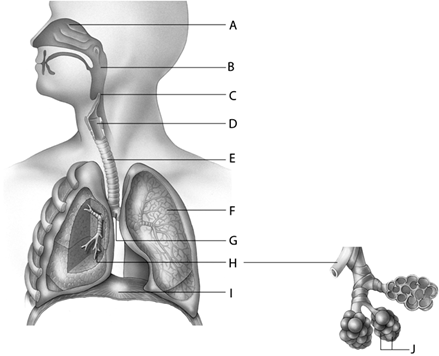 In the above diagram, the _____ is/are labeled with the letter "J."
In the above diagram, the _____ is/are labeled with the letter "J."A) bronchi
B) bronchioles
C) diaphragm
D) alveoli
E) trachea

Unlock Deck
Unlock for access to all 74 flashcards in this deck.
Unlock Deck
k this deck
62
Match between columns

Unlock Deck
Unlock for access to all 74 flashcards in this deck.
Unlock Deck
k this deck
63
Match between columns

Unlock Deck
Unlock for access to all 74 flashcards in this deck.
Unlock Deck
k this deck
64
The pulmonary capillaries _____.
A) are closely associated with alveoli but do not fuse with them
B) fuse with the alveoli to facilitate gas exchange
C) bring oxygenated blood back to the heart
D) bring deoxygenated blood back to the heart
E) fuse with the alveoli to facilitate gas exchange and bring oxygenated blood back to the heart
A) are closely associated with alveoli but do not fuse with them
B) fuse with the alveoli to facilitate gas exchange
C) bring oxygenated blood back to the heart
D) bring deoxygenated blood back to the heart
E) fuse with the alveoli to facilitate gas exchange and bring oxygenated blood back to the heart

Unlock Deck
Unlock for access to all 74 flashcards in this deck.
Unlock Deck
k this deck
65
Match between columns

Unlock Deck
Unlock for access to all 74 flashcards in this deck.
Unlock Deck
k this deck
66
Exhalation _____.
A) is always active
B) is always passive
C) may be both active and passive
D) compresses alveoli
E) may be both active and passive and compresses alveoli
A) is always active
B) is always passive
C) may be both active and passive
D) compresses alveoli
E) may be both active and passive and compresses alveoli

Unlock Deck
Unlock for access to all 74 flashcards in this deck.
Unlock Deck
k this deck
67
A unique feature of the diaphragm is that it is_____.
A) the only smooth muscle in the human body
B) the only smooth muscle that can be voluntarily controlled
C) only found in humans
D) the only skeletal muscle that is under involuntary control
E) easily replaceable
A) the only smooth muscle in the human body
B) the only smooth muscle that can be voluntarily controlled
C) only found in humans
D) the only skeletal muscle that is under involuntary control
E) easily replaceable

Unlock Deck
Unlock for access to all 74 flashcards in this deck.
Unlock Deck
k this deck
68
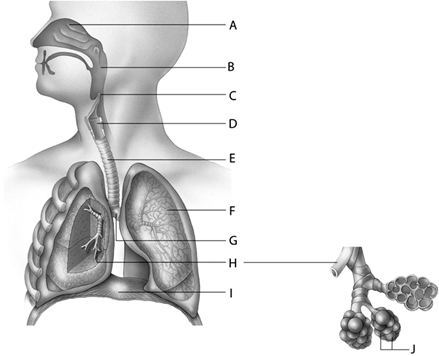 In the above diagram, the _____ is/are labeled with the letter "E."
In the above diagram, the _____ is/are labeled with the letter "E."A) e sophagus
B) l arynx
C) t rachea
D) e piglottis
E) b ronchi

Unlock Deck
Unlock for access to all 74 flashcards in this deck.
Unlock Deck
k this deck
69
Breathing rates are automatically increased when _____ levels are _____.
A) oxygen; high
B) carbon dioxide; high
C) oxygen; low
D) carbon dioxide; low
E) ATP; low
A) oxygen; high
B) carbon dioxide; high
C) oxygen; low
D) carbon dioxide; low
E) ATP; low

Unlock Deck
Unlock for access to all 74 flashcards in this deck.
Unlock Deck
k this deck
70
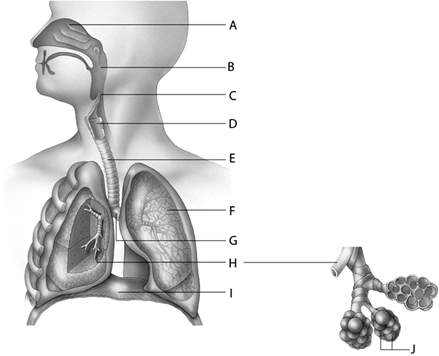 During swallowing, the _____ covers the entrance to the larynx. This structure is identified and labeled as letter _____ in the above diagram.
During swallowing, the _____ covers the entrance to the larynx. This structure is identified and labeled as letter _____ in the above diagram.A) epiglottis; E
B) pharynx; B
C) glottis; C
D) epiglottis; C
E) trachea; E

Unlock Deck
Unlock for access to all 74 flashcards in this deck.
Unlock Deck
k this deck
71
The respiratory pacemaker is located in the ____.
A) lungs
B) cerebral cortex
C) brain stem
D) bronchioles
E) alveoli
A) lungs
B) cerebral cortex
C) brain stem
D) bronchioles
E) alveoli

Unlock Deck
Unlock for access to all 74 flashcards in this deck.
Unlock Deck
k this deck
72
Match between columns

Unlock Deck
Unlock for access to all 74 flashcards in this deck.
Unlock Deck
k this deck
73
During inhalation, the diaphragm moves _____ and the intercostal muscles move the rib cage _____.
A) downward; outward
B) outward; downward
C) outward; outward
D) downward; downward
E) outward; upward
A) downward; outward
B) outward; downward
C) outward; outward
D) downward; downward
E) outward; upward

Unlock Deck
Unlock for access to all 74 flashcards in this deck.
Unlock Deck
k this deck
74
Breathing is under _____ control.
A) voluntary
B) involuntary
C) voluntary and involuntary
D) Oxygen-mediated
E) ATP-mediated
A) voluntary
B) involuntary
C) voluntary and involuntary
D) Oxygen-mediated
E) ATP-mediated

Unlock Deck
Unlock for access to all 74 flashcards in this deck.
Unlock Deck
k this deck


